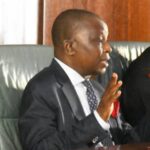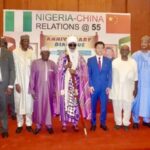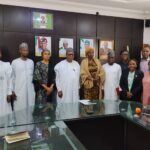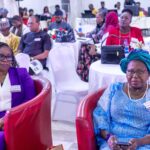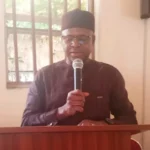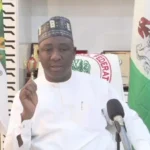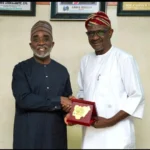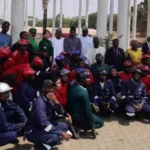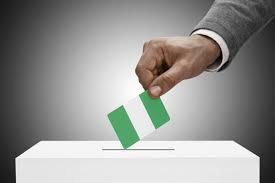By Fortune Abang, News Agency of Nigeria (NAN)
The quest by Nigerians in the Diaspora Organisation (NiDO)-Worldwide for inclusion of an estimated 20million Nigerians living in the diaspora to participate in electoral processes has continued to gain considerable momentum.
NiDO’s pursuit, observers say, will enable Nigerians in the Diaspora to exercise their franchise during national elections.
According to NiDO-Worldwide, it is concerned that successive governments expressed support for diaspora voting but neglected to push legislation or constitutional amendments to achieve set targets.
It regrets the failure by past administrations to bring the Diaspora Voting Bill into Law, even after it went through Second Reading.
Worthy of note, in 2024, again, a bill seeking to amend the Constitution to provide for diaspora voting passed second reading in the House of Representatives and was referred to the Constitution Amendment Committee for further legislative action.
Proponents of Diaspora Voting argue that Diasporan contributions through remittances make up a huge chunk of the nation’s Internally Generated Revenue.
Some Nigerians in Diaspora who spoke on the subject matter said that several African countries had embraced diaspora enfranchisement, while Nigeria and some others have been hesitant.
Dr Loretta Ogboro-Okor, Director-General of the Edo Diaspora Agency, said there was need for sustained advocacy towards legislating and passing the Diaspora Voting Bill into law, to enable Nigerians elect competent leaders in future elections.
She said that diaspora voting policy, if implemented, would empower Nigerians abroad to further contribute actively to nation-building processes, by bringing back skills and expertise developed overseas.
“Diaspora Voting is going to benefit everybody. Right now, some people think it will only benefit those in government, but that’s not true.
“It is a combination of top-down and bottom-up approaches to pushing Nigeria forward; we will be putting square pegs in square holes, and that will enhance governance in Nigeria.
“Imagine voting and not feeling left out; you will feel a responsibility to return and contribute your quota to national development,” she said.
Policy analysts say that countries like South Africa have permitted diaspora voting in presidential elections at embassies and also Ghana has permitted such since 2006 amidst partial implementation and technical barriers.
“Also is the fact that Kenya permitted diaspora voting since 2013 with limited presidential elections and persistent logistic issues, while Senegal fully permitted Diasporas to elect legislators dedicated to overseas constituencies.
“Mali fully permitted diaspora voting with well-integrated and dedicated diaspora seats in parliaments, as well as Tunisia that fully permitted Tunisians abroad to elect their own representatives.
“Similarly, French citizens abroad have 11-dedicated diaspora seats in the National Assembly in France and Italians abroad elect members of Parliament directly from overseas constituencies in Italy.
“India allows expatriates to vote; although actual implementation is restrictive, physical presence at Indian polling stations is needed.
“Mexican citizens abroad can vote in presidential elections via mail and, recently, online, while Americans living abroad can vote via absentee ballots for federal elections in the U.S.,’’ an analyst said.
More so, the former Chairperson of NiDO Europe, Dr Collins Nweke, stressed the need for government to exercise its political will in advancing the cause for the realisation of diaspora voting.
Nweke, a Fellow of the Chartered Institute of Public Management of Nigeria and also Fellow, International Association of Research Scholars and Administrators, said diaspora voting was no longer a luxury, but democratic imperative in globalised world.
“Nigeria’s failure to enfranchise its diaspora community contradicts its aspirations for inclusive governance and development.
“Comparative experiences from Africa and beyond show that the political, logistical and constitutional hurdles Nigeria faces are surmountable; overcoming them requires political will and strategic planning; now is the time to act,” Nweke said.
In the same vein, the National Association of Nigerian Students in Diaspora (NANS-Diaspora) urged government to expedite amendments to the Constitution to enable Nigerians living abroad to participate in elections.
President of NANS-Diaspora, Chris Fayomi, underscored the need for diaspora voting, beginning with the 2027 elections.
According to the president, millions of Nigerians in the diaspora contribute immensely to Nigeria’s economy, with remittances reaching record highs of more than 23 billion dollars in a single year.
“This implies about 5 per cent contribution to Nigeria’s GDP; yet we remain disenfranchised and excluded from the democratic process in national decision-making.
“Hence, this call is to rightfully request our democratic access to vote as Nigerian citizens living abroad.
“Diaspora Voting has been successfully exemplified by other African countries, and as such, the Nigerian government should embrace this monumental stride that empowers its citizens abroad to lawfully vote for their leaders,” he said.
On his part, Mr Obed Monago, a former Chair of Nigerians in Diaspora Organisation – Americas (NIDOA), described as unfortunate the fact that past governments did not deem it fit to pass diaspora voting into law, amid several appeals by NiDO-Worldwide.
“Even after it went for the second reading, it was voted down; so, it is really quite unfortunate that government did not put into consideration the contribution and the impact of the Diasporas to the socio-economic wellbeing of Nigeria.
“The thinking is basically not welcome, but we are not relenting; we are going to take up the fight this time.
“It is going to be more organised and we are going to take it up collectively with the Tenth National Assembly too, hopefully this time we are going to prevail,” he said.
Speaking on the subject matter, Dr Abike Dabiri-Erewa, Chief Executive Officer of Nigerians in Diaspora Commission (NIDCOM), called on compatriots abroad to form a united front aimed at promoting diaspora voting in Nigeria.
Dabiri-Erewa made the call at a recent virtual conference centred on institution of diaspora voting in Nigeria, organised by FixPolitics Diaspora Dialogue, a non-governmental organisation.
According to her, Nigerians are everywhere across the world and can work closely together in a bid to achieve their pursuit for diaspora voting.
“Nobody in the Diaspora can have an edge over the other; there is no where we do not have Nigerians; more importantly, we should have everything in place before diaspora voting; it must not start immediately.
“Let it start when INEC feels it is ready for it, because we cannot keep amending the constitution all the time about this,” she said.
A foreign affairs analyst said that most advanced democracies allowed remote voting, absentee ballots, postal voting and online platforms.
He urged government to recognise the diaspora’s economic power and actively promote their political inclusion, as bridge to investment and soft diplomacy.
“Although INEC’s ability to conduct credible elections domestically pose concerns about expansion abroad, in terms of cost implications, voter verification abroad, security and diplomatic coordination, there is need for the establishment of polling stations at various Nigerian consulate abroad and voter education campaign to achieve progress,’’ he said.
He said in spite of their citizenship and tremendous capacity, NiDO contributed positively to the Nigerian project; yet Nigerians in the diaspora continue to be denied their fundamental right to vote.
Stakeholders hold that disenfranchising Nigerians in the Diaspora does not only undermine the principles of democracy; it also diminishes potential for diaspora engagement in shaping the policies and decisions that impact their lives and millions of Nigerians back home.(NANFeatures)
*** If used, please credit the writer and the News Agency of Nigeria.

